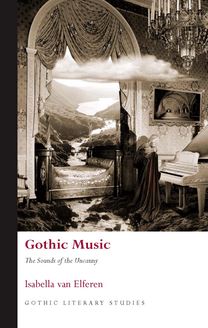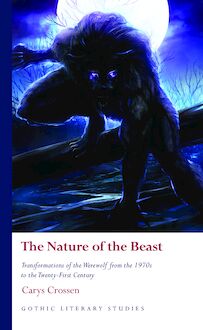-
 Univers
Univers
-
 Ebooks
Ebooks
-
 Livres audio
Livres audio
-
 Presse
Presse
-
 Podcasts
Podcasts
-
 BD
BD
-
 Documents
Documents
-
- Cours
- Révisions
- Ressources pédagogiques
- Sciences de l’éducation
- Manuels scolaires
- Langues
- Travaux de classe
- Annales de BEP
- Etudes supérieures
- Maternelle et primaire
- Fiches de lecture
- Orientation scolaire
- Méthodologie
- Corrigés de devoir
- Annales d’examens et concours
- Annales du bac
- Annales du brevet
- Rapports de stage
La lecture à portée de main
Vous pourrez modifier la taille du texte de cet ouvrage
Découvre YouScribe en t'inscrivant gratuitement
Je m'inscrisDécouvre YouScribe en t'inscrivant gratuitement
Je m'inscrisEn savoir plus
Vous pourrez modifier la taille du texte de cet ouvrage
En savoir plus

Description
This book brings together fourteen of the most ambitious and thought-provoking recent essays by David Punter, who has been writing on the Gothic to academic and general acclaim for over thirty years. Punter addresses developments in Gothic writing and Gothic criticism since the mid-eighteenth century, by isolating and discussing specific themes and scenarios that have remained relevant to literary and philosophical discussion over the decades and centuries, and also by paying close attention to the motifs, figures and recurrences that loom so large in twenty-first-century engagements with the Gothic. This book, while engaging deeply with Gothic history, constantly addresses our continuing immediate encounters with Gothic tropes – the vampire, the zombie, the phantom, the living dead.
Phantoms of Theory
1) Spectrality: The Ghosting of Theory
Fables of History
2) Francis Lathom in the Eighteenth Century
3) Types of Tyranny
Sciences of the Strange
4) Pseudo-Science and the Creation of Monsters
5) Technogenealogies: Family Secrets
6) The Abhuman Remains of the Gothic
7) ‘A Foot is What fits the Shoe’: Gothic, Disability and Prosthesis
Some Humans, Some Monstrosities
8) M.R. James: Terror and History
9) Dark and Light Rays: The Penetration of the Body
10) Of Monsters and Animals
Global, Local, War
11) Cyborgs, Borders and Stories for Virgins: Mexico and the Gothic
12) Heart Lands: Contemporary Scottish Gothic
Last Things
13) Grievous Bodily Harm
14) Thoughts on Teaching Psychoanalysis and the Gothic
Sujets
Informations
| Publié par | University of Wales Press |
| Date de parution | 20 avril 2016 |
| Nombre de lectures | 0 |
| EAN13 | 9781783168231 |
| Langue | English |
Informations légales : prix de location à la page 0,2174€. Cette information est donnée uniquement à titre indicatif conformément à la législation en vigueur.
Extrait
SERIES PREFACE
Gothic Literary Studies is dedicated to publishing groundbreaking scholarship on Gothic in literature and film. The Gothic, which has been subjected to a variety of critical and theoretical approaches, is a form which plays an important role in our understanding of literary, intellectual and cultural histories. The series seeks to promote challenging and innovative approaches to Gothic which question any aspect of the Gothic tradition or perceived critical orthodoxy. Volumes in the series explore how issues such as gender, religion, nation and sexuality have shaped our view of the Gothic tradition. Both academically rigorous and informed by the latest developments in critical theory, the series provides an important focus for scholarly developments in Gothic studies, literary studies, cultural studies and critical theory. The series will be of interest to students of all levels and to scholars and teachers of the Gothic and literary and cultural histories.
SERIES EDITORS
Andrew Smith, University of Sheffield
Benjamin F. Fisher, University of Mississippi
EDITORIAL BOARD
Kent Ljungquist, Worcester Polytechnic Institute Massachusetts
Richard Fusco, St Joseph’s University, Philadelphia
David Punter, University of Bristol
Chris Baldick, University of London
Angela Wright, University of Sheffield
Jerrold E. Hogle, University of Arizona
For all titles in the Gothic Literary Studies series
please visit www.uwp.co.uk
The Gothic Condition
Terror, History and the Psyche
David Punter
UNIVERSITY OF WALES PRESS
2016
© David Punter, 2016
All rights reserved. No part of this book may be reproduced in any material form (including photocopying or storing it in any medium by electronic means and whether or not transiently or incidentally to some other use of this publication) without the written permission of the copyright owner. Applications for the copyright owner’s written permission to reproduce any part of this publication should be addressed to the University of Wales Press, 10 Columbus Walk, Brigantine Place, Cardiff CF10 4UP.
www.uwp.co.uk
British Library Cataloguing-in-Publication Data
A catalogue record for this book is available from the British Library.
ISBN 978-1-78316-821-7
e-ISBN 978-1-78316-823-1
The right of David Punter to be identified as author of this work has been asserted in accordance with sections 77 and 79 of the Copyright, Designs and Patents Act 1988.
C ONTENTS
Acknowledgements
Introduction
Phantoms of Theory
1 Spectrality: The Ghosting of Theory
Fables of History
2 Francis Lathom in the Eighteenth Century
3 Types of Tyranny
Sciences of the Strange
4 Pseudo-Science and the Creation of Monsters
5 Technogenealogies: Family Secrets
6 The Abhuman Remains of the Gothic
7 ‘A Foot is What Fits the Shoe’: Gothic, Disability and Prosthesis
Some Humans, Some Monstrosities
8 M. R. James: Terror and History
9 Dark and Light Rays: The Penetration of the Body
10 Of Monsters and Animals
Global, Local, War
11 Cyborgs, Borders and Stories for Virgins: Mexico and the Gothic
12 Heart Lands: Contemporary Scottish Gothic
Last Things
13 Grievous Bodily Harm
14 Thoughts on Teaching Psychoanalysis and the Gothic
Notes
Bibliography
A CKNOWLEDGEMENTS
‘Spectrality: The Ghosting of Theory’ was first delivered as a guest lecture in 2002 at Leeds Metropolitan University, and subsequently, in a different form, at a conference on Postmodernism and Spirituality the same year at the University of Central Lancashire.
‘Francis Lathom in the Eighteenth Century’ was first published in Gothic Studies in 2003. ‘Types of Tyranny’ is a version, much amended, of a keynote paper given at a conference on Liberty and Limits at Macquarie University, Sydney, Australia, in 2013.
‘Pseudo-Science and the Creation of Monsters’ was the result of an invitation to address a symposium on science and literature at King’s College School, Wimbledon in 2005. ‘Technogenealogies: Family Secrets’ has had several outings in different guises; probably the most significant was in the form of a paper at the 2012 conference of the European Society for the Study of English held at Boğaziçi University, Istanbul. ‘The Abhuman Remains of the Gothic’ was delivered at a conference on human remains under the auspices of the Hunterian Museum, London, in 2013. ‘“A Foot is What Fits the Shoe”’ was published, again in Gothic Studies , in 2000.
‘M. R. James: Terror and History’ is the result of a collision between two papers, one delivered at a symposium on the Renaissance and Gothic at the University of Cologne in 2009, the other, much revised, at Salford University in 2001. ‘Dark and Light Rays’ was delivered at the 2013 conference of the International Gothic Association at the University of Surrey. ‘Of Monsters and Animals’ was given in 2011 at a conference on monstrosity at De Montfort University, Leicester.
‘Cyborgs, Borders and Stories for Virgins’ has a complex history: it principally involves elements from a keynote lecture at a conference on the fantastic at the University of Naples in 2007, and one given that same year to a symposium on global Gothic at the University of Stirling; it has been previously available on the website www.gothic.stirling.ac.uk . ‘Heart Lands’ was originally published in Gothic Studies in 1999.
‘Grievous Bodily Harm’ was a keynote lecture at the conference of the International Gothic Association at the University of Heidelberg in 2011. ‘Thoughts on Teaching Psychoanalysis and the Gothic’ is from 2003, when it was delivered at a conference on the ‘remains’ of the Gothic at the University of Toulouse; it was published in Anglophonia the following year.
A LSO BY D AVID P UNTER
The Literature of Terror: A History of Gothic Fictions from 1765 to the Present Day
Romanticism and Ideology: Studies in English Writing 1765–1830 (with David Aers and Jonathan Cook)
Blake, Hegel and Dialectic
The Hidden Script: Writing and the Unconscious
Introduction to Contemporary Cultural Studies (editor)
William Blake: Selected Poetry and Prose (editor)
The Romantic Unconscious: A Study in Narcissism and Patriarchy
Notes on Selected Poems of Philip Larkin
William Blake: The New Casebook (editor)
Romanticism (CD-ROM: Annotated Bibliography of English Studies , Vol. 306)
Notes on William Blake’s ‘Songs of Innocence and of Experience’
Gothic Pathologies: The Text, the Body and the Law
Spectral Readings: Towards a Gothic Geography (editor, with Glennis Byron)
Writing the Passions
Postcolonial Imaginings: Fictions of a New World Order
The Gothic (with Glennis Byron)
The Influence of Postmodernism on Contemporary Writing
Metaphor
Modernity
Rapture: Literature, Addiction, Secrecy
A New Companion to the Gothic (editor)
The Encyclopaedia of the Gothic (editor, with William Hughes and Andrew Smith)
The Literature of Pity
Poetry
China and Glass
Lost in the Supermarket
Asleep at the Wheel
Selected Short Stories
Foreign Ministry
Introduction
This book is both a monograph and not a monograph. It is a monograph in the traditional sense that it is all written by one hand; it is not a monograph in that it is a collection consisting variously of essays previously published in journal form and material delivered either as conference papers or as guest lectures at various universities.
I have gathered these essays and lectures, spread as they have been in their original incarnations over sixteen years, together under the title The Gothic Condition ; and the reason for this is that in various ways and in various contexts the world does now seem, in a very particular way, to be in a Gothic condition. The first book I published on Gothic, The Literature of Terror (1980), deliberately used the word ‘terror’ in a traditional, generic sense, the sense often referred to by Gothicists, especially when attempting that difficult distinction between ‘terror’ and ‘horror’, but as time has gone on the word itself has accreted further meanings and connotations. In an essay I published in 1991, ‘The Terrorist’s Story: The Reign of Terror and Later Terrorists in Literature’, I tried to reflect on this; for in some ways referring to Gothic as a ‘literature of terror’ has come to seem increasingly callow when confronted with the very real regimes of terror which now control so much of the world.
Certainly the early Gothic writers of the late eighteenth and early nineteenth centuries were aware of the possibility of ‘regimes of terror’: in Europe it was necessary only to look at how the early hopes and political ambitions represented in the French revolution had been changed, perverted into a system of oppression, an increasingly silenced world that showed signs of spreading to engulf other nations, other states. And there is a link between terror and silence: the individual, distinctive human voice, as writers from Kafka to Primo Levi have reminded us, is a mark of distinction and freedom, and is thus hated and despised by those who wish to assert an undisputed authority over us.
Yet this it to put the matter too simply, for it is certainly not through a quasi-theological emphasis on individuality that terror and repression can be resisted, but only through new forms of communality, new ways of overcoming alienation. What has this to do with Gothic? Let us consider an example, the representation of the figure of the zombie in recent years.
The zombie is one of the recurring inhabitants of what we might refer to as the ‘Gothic bestiary’, alongside the monster, the vampire, the werewolf and other more arcane but endlessly proliferating examples. But these denizens of the menagerie of the dark imagination do not arise by chance, neither are they susceptible of a single, static interpretation; on the contrary, they mould themselves to, and are moulded by, cultural fears, anxieties and priorities. During the period when slavery was a matter of coloni
-
 Univers
Univers
-
 Ebooks
Ebooks
-
 Livres audio
Livres audio
-
 Presse
Presse
-
 Podcasts
Podcasts
-
 BD
BD
-
 Documents
Documents
-
Jeunesse
-
Littérature
-
Ressources professionnelles
-
Santé et bien-être
-
Savoirs
-
Education
-
Loisirs et hobbies
-
Art, musique et cinéma
-
Actualité et débat de société
-
Jeunesse
-
Littérature
-
Ressources professionnelles
-
Santé et bien-être
-
Savoirs
-
Education
-
Loisirs et hobbies
-
Art, musique et cinéma
-
Actualité et débat de société
-
Actualités
-
Lifestyle
-
Presse jeunesse
-
Presse professionnelle
-
Pratique
-
Presse sportive
-
Presse internationale
-
Culture & Médias
-
Action et Aventures
-
Science-fiction et Fantasy
-
Société
-
Jeunesse
-
Littérature
-
Ressources professionnelles
-
Santé et bien-être
-
Savoirs
-
Education
-
Loisirs et hobbies
-
Art, musique et cinéma
-
Actualité et débat de société
- Cours
- Révisions
- Ressources pédagogiques
- Sciences de l’éducation
- Manuels scolaires
- Langues
- Travaux de classe
- Annales de BEP
- Etudes supérieures
- Maternelle et primaire
- Fiches de lecture
- Orientation scolaire
- Méthodologie
- Corrigés de devoir
- Annales d’examens et concours
- Annales du bac
- Annales du brevet
- Rapports de stage




















